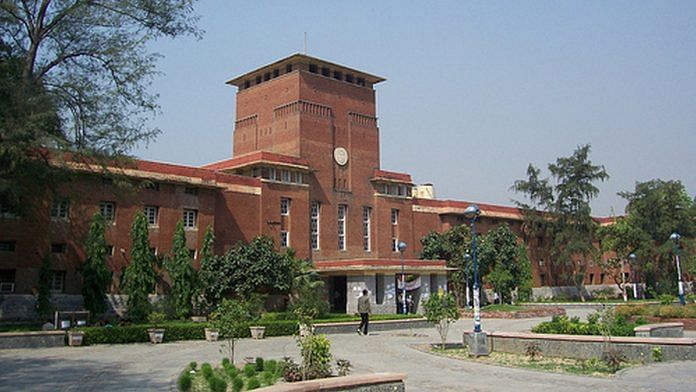New Delhi: Delhi University is set to roll out the four-year undergraduate programme (FYUP) from the next academic session (2022-23) after it received approval from the Academic Council late Tuesday.
In the meeting, the council — which looks after all academic and administrative matters of the university — approved the implementation of provisions under the new National Education Policy (NEP) and the FYUP is part of the policy.
The four-year undergraduate programme has multiple entry and exit options along with a blended (both online and offline) mode of learning and a bank of credits — an academic repository of a student’s credits that they have earned in college.
Dr Vikas Gupta, the registrar of the university, said, “The four-year undergraduate programme has been approved by the Academic Council with the suggestion that reshuffling of papers will be allowed with prior permission.” This means that students will be allowed to choose the papers that they want to study for their course.
“Lateral entry of students will also be permitted — that is if after studying in DU for some time, if a student wants to shift to another institution they can do so. However, in order to accept such entries to DU, an assessment of seats and infrastructure available will be done and entrance exams will be conducted,” Gupta told ThePrint.
Furthermore, under the new rules, the university will provide a choice between a three-year honours course or a four-year honours course, which includes one year of research.
The duration of the post-graduation course will then depend on the duration of the undergraduate degree.
The multiple entry and exit options under the new programme are also expected to allow students flexibility and will give qualifications based on the number of years they have studied: A certificate for completing one year, a diploma in two, a three-year degree or a four-year undergraduate degree if they complete the course.
In September 2020, a 42-member committee was formed to look into the implementation of the NEP in Delhi University. This committee, comprising principals, teachers and professors, was headed by Professor Vivek Suneja, dean of the Faculty of Management Studies.
Also read: Student-centric NEP will change society, Karnataka education minister says as state unveils policy
Professors object to FYUP
Delhi University staff, however, continue to oppose several FYUP provisions.
Rajesh Jha, a professor in DU, told ThePrint, “With the four-year programme, students will easily give up. The blended mode of learning means 40 per cent of coursework will be covered through online learning and the pandemic has made a case in point that digital learning is not accessible for all.”
Professors also claimed that several provisions of the NEP were not openly discussed with them, and fear that it puts their jobs at risk since the number of students will fluctuate annually.
DU had earlier implemented FYUP in 2013 when Professor Dinesh Singh was the vice-chancellor but the programme was junked a year later by the Smriti Irani-led Ministry of Human Resource Development (now Ministry of Education).
(Edited by Rachel John)
Also read: Indian universities are being taught how to generate funds like Harvard & Cambridge



